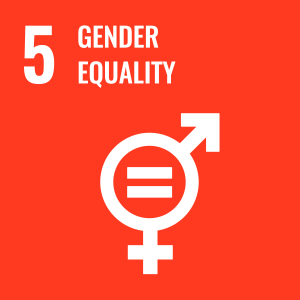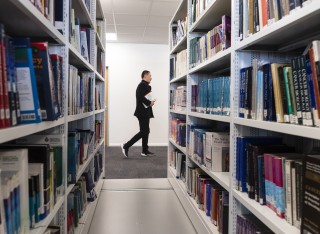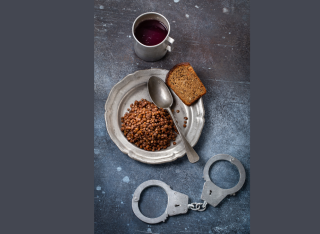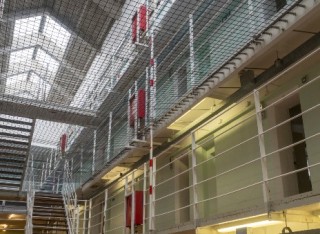Dr Maria Adams
About
Biography
I am an Associate Professor in Criminology and Programme Director for the MSc in Criminology and MSc in Social Research at the University of Surrey . I graduated with a PhD in 2017 titled: “We are living their sentence with them…” - How prisoners' families experience life inside and outside prison spaces in Scotland. Prior to my PhD, I completed my Master of Arts in Sociology at City University and Bachelor of Arts (Hons) in Sociology at the University of Leicester.
My research and teaching are centred on issues surrounding prisons, including food in prison and the effects of imprisonment on families of prisoners.
I am a PI on a funded ESRC project called on Doing Porridge: Understanding women’s experiences of food in prison. This is a two year project adopting qualitative approaches with 108 women who participated in this project and shared their stories on issues around food, identities, space and relationships.
From this study, we produced a short 3 minute animation, which features vignettes from three women (Billie, Jasminder and Louise) from this study. This video, produced by Nifty Fox Creative, highlights how food interlinks with the women’s identity, culture and sense of self. Please see research tab for further details.
We were also featured on the Secret Lives of Prisons podcast with a special episode on food in women's prisons.
My book titled 'Prisoners' families, Emotions and Space', co-authored 'The Impact of youth imprisonment on the lives of parents' and Beyond Porridge are now released.
University roles and responsibilities
- Programme Director in MSc in Criminology and Social Research Methods
News
In the media
ResearchResearch interests
I am very interested in research surrounding issues related to the prison system. I conducted a PhD on the experiences of families of prisoners in Scotland. I am now a PI for several projects including:
Research Projects:
- Food in Women’s prisons
I am a principal investigator for an ESRC funded project called Doing Porridge: Understanding women’s experiences of food in prison. This is a two year project from September 2021-September 2023. This project aims to analyse the experience of food in women’s prisons using an intersectional approach. It adopts an innovative suite of mixed qualitative methods in order to gain valuable insight into women’s experiences of this aspect of prison life. The study will open up wider conversations about food in prisons through an exhibition of prisoners’ art run in partnership with Koestler Arts. This project will make a significant contribution to understanding issues related to food, gender and ethnicity, and will provide an invaluable insight into how food forms part of women’s identities and experiences in prison.
Please see website for further details: Doing Porridge: Understanding women’s experiences of food in prison | University of Surrey
- Families, food and visiting rooms in a women’s prison
I am a principal investigator for a BA small grants called Food, families and visiting rooms in a women’s prison. This will be a two year project. We will explore how food contributes to improving the quality of visits; and more importantly, how this may strengthen the ties between women and their loved ones. The interview sample will be ten women in prison and ten family members (over the age of 18 only). Family members can be considered as ‘partner’, ‘child’, ‘parent of prisoner’ or siblings. Additionally, interviews will take place with three members of staff within the visiting room who can provide insightful observations in relation to food and visits over time. These interviews will be combined with observations of the role that food plays in the interactions between the women, their families and prison staff in the visiting room.
Aims of this study:
- To understand how food is utilised in the visiting room to strengthen familial ties between women in prison and their loved ones.
- To explore the preparation of food in the visiting rooms of a women’s prison.
- To examine the consumption food as a tool to strengthen social interactions between women, family members and their children.
- To explore how food can contribute to women adopting their familial roles to bond with their relatives in the visiting room.
- To reflect on how food is utilised to celebrate special events, i.e. birthdays, religious events; and how women and their families practise this in the visiting rooms.
- To identify policy and practical recommendations to improve the quality and experience of food in visiting rooms.
Please see website for further details: Food, families and visiting rooms in a women's prison.
- Developing family engagement models with front-line youth justice practitioners
I am a principal investigator for a Nuffield Foundation grant to examine ways in which youth justice services can enhance communication with families of young people subject to court-based orders and out of court-disposals.
Please see website for further details: Developing family engagement models with front-line youth justice practitioners - Nuffield Foundation
- University Global Partnership Network
I am one of the lead investigators for a UGPN grant titled 'Punishment, Families and Communities in the context of England and Brazil’ working in partnership with the University of Sao Paulo.
This project will be to explore the relational dynamics between the prison system, families and communities in England and Brazil. Furthermore, the aim will be to address two UN goals: ‘Peace, Justice and Strong Institutions’ and ‘Sustainable Cities and Communities’. This will be explored by undertaking several activities to assess issues related to structural inequalities; defining quality of life; and to understand how the structures of community and policing exert different outcomes and processes on prisoner re-entry pathways, including the effects on families and community living at large.
Research interests
I am very interested in research surrounding issues related to the prison system. I conducted a PhD on the experiences of families of prisoners in Scotland. I am now a PI for several projects including:
Research Projects:
- Food in Women’s prisons
I am a principal investigator for an ESRC funded project called Doing Porridge: Understanding women’s experiences of food in prison. This is a two year project from September 2021-September 2023. This project aims to analyse the experience of food in women’s prisons using an intersectional approach. It adopts an innovative suite of mixed qualitative methods in order to gain valuable insight into women’s experiences of this aspect of prison life. The study will open up wider conversations about food in prisons through an exhibition of prisoners’ art run in partnership with Koestler Arts. This project will make a significant contribution to understanding issues related to food, gender and ethnicity, and will provide an invaluable insight into how food forms part of women’s identities and experiences in prison.
Please see website for further details: Doing Porridge: Understanding women’s experiences of food in prison | University of Surrey
- Families, food and visiting rooms in a women’s prison
I am a principal investigator for a BA small grants called Food, families and visiting rooms in a women’s prison. This will be a two year project. We will explore how food contributes to improving the quality of visits; and more importantly, how this may strengthen the ties between women and their loved ones. The interview sample will be ten women in prison and ten family members (over the age of 18 only). Family members can be considered as ‘partner’, ‘child’, ‘parent of prisoner’ or siblings. Additionally, interviews will take place with three members of staff within the visiting room who can provide insightful observations in relation to food and visits over time. These interviews will be combined with observations of the role that food plays in the interactions between the women, their families and prison staff in the visiting room.
Aims of this study:
- To understand how food is utilised in the visiting room to strengthen familial ties between women in prison and their loved ones.
- To explore the preparation of food in the visiting rooms of a women’s prison.
- To examine the consumption food as a tool to strengthen social interactions between women, family members and their children.
- To explore how food can contribute to women adopting their familial roles to bond with their relatives in the visiting room.
- To reflect on how food is utilised to celebrate special events, i.e. birthdays, religious events; and how women and their families practise this in the visiting rooms.
- To identify policy and practical recommendations to improve the quality and experience of food in visiting rooms.
Please see website for further details: Food, families and visiting rooms in a women's prison.
- Developing family engagement models with front-line youth justice practitioners
I am a principal investigator for a Nuffield Foundation grant to examine ways in which youth justice services can enhance communication with families of young people subject to court-based orders and out of court-disposals.
Please see website for further details: Developing family engagement models with front-line youth justice practitioners - Nuffield Foundation
- University Global Partnership Network
I am one of the lead investigators for a UGPN grant titled 'Punishment, Families and Communities in the context of England and Brazil’ working in partnership with the University of Sao Paulo.
This project will be to explore the relational dynamics between the prison system, families and communities in England and Brazil. Furthermore, the aim will be to address two UN goals: ‘Peace, Justice and Strong Institutions’ and ‘Sustainable Cities and Communities’. This will be explored by undertaking several activities to assess issues related to structural inequalities; defining quality of life; and to understand how the structures of community and policing exert different outcomes and processes on prisoner re-entry pathways, including the effects on families and community living at large.
Supervision
Postgraduate research supervision
I am pleased to accept applications for PhD supervision in the field of penology including issues surrounding prison culture, social identity and the effects of incarceration.
Teaching
I am programme director for the MSc in Criminology. I am also module convenor for the following modules including:
SOC2073 Punishment and Society (Year 2)
SOC3055 Prisons and Prisoners (Year 3)
SOCMOO8 Criminal Justice System (Masters)
Sustainable development goals
My research interests are related to the following:



Publications
Prison visits are important opportunities for those incarcerated to see their family members and maintain and strengthen family relationships. However, prison visits can be experienced as a stressful environment where family members lack control. This paper advances understandings of the prison visiting room as a space for foodcare – one that presents opportunities for incarcerated women and their family members to ‘re-do’ family by demonstrating care through food choices. Consuming refreshments together and purchasing items that would ‘treat’ incarcerated family members helped to evoke memories of eating together in childhood or prior to incarceration. The qualitative data from incarcerated women in a prison in England and their visiting family members documented how restrictions brought in concerning refreshments in the Covid-19 pandemic temporarily eliminated opportunities for family foodcare. Furthermore, when refreshments were re-introduced in a limited way, they were interpreted negatively due to an assumption that their pre-packaged nature meant they were lacking care, simultaneously demonstrating the social and familial importance of refreshments within the space of the prison visiting room
Prison is a space of deprivation of liberty with multiple ‘pains of imprisonment’ inflicted on those serving time. One component of the prison experience seldom discussed is the impact of food, particularly the ways in which food communicates broader issues about penal legitimacy. Penal legitimacy – how the penal regime operates in ways which command authority and willingness to comply – has been understood through a multitude of prison regime elements, but rarely in the context of food. We reflect on the outcomes of these experiences and perceptions of food from the perspectives of women in prison, highlighting how these perceptions can impact on the legitimacy of the prison establishment and overall quality of life in prison. Data is drawn from fieldwork in four women's prisons in England, comprising 108 study participants.
An illustrated collection of recipes and advice based around the experiences of women separated from their families by imprisonment. Beyond Porridge engages with creativity, social interactions and diversity within prison walls. The book explains how women in prison use limited ingredients to supplement their standard prison diet and enjoy a 'minor feast'. It tells of the comfort foods they miss most. In their own words and illustrations the book shows how ingenuity can spring from the most unlikely of circumstances.The book is based on a project led by researchers at the University of Surrey. It introduces readers to Chocolate Pudding in a Mug, a quick version of Callaloo prepared in a prison cell, Mackerel Curry, Pumpkin Seed Fry, Oreo Cheesecake and Kettle Chow Mein.
This toolkit is designed for prison governors and staff to improve the quality of food. It will help those involved in the preparation and production of food in women’s prisons to reflect on existing practices and to identify ways forward to improve the relationship between women and food in prison. The material in the toolkit is drawn from ESRC- and British Academy/Leverhulme-funded qualitative studies that focused on the role of food in women’s prisons. It has been devised in partnership with His Majesty’s Prison and Probation Service and charitable organisations including Women in Prison, Food Behind Bars, Food Matters and PACT.
There is substantial literature on the importance of food in family life, but much less on women who are incarcerated and who therefore have limited opportunities to eat with their families. The space of the visiting room offers one opportunity, albeit restricted in time and space, to do this, as well as making the visit more enjoyable for family members who have often travelled long distances to see their loved one (Comfort, 2008; Jardine, 2019; Adams, 2022). In this chapter, we will examine how we can integrate the concepts of eating with the family and prison to contribute to the dialogue on passing the time. We will develop the notion of "Doing Commensality" to understand the relationship between how women in prison and their families experience meaningful eating practices in the prison visiting room and beyond. Furthermore, we will explore whether these types of eating practices can be a means to reunite and to strengthen familial bonds. The aims of this chapter will include: (1) to explore the importance of food practices that are adopted in the confinement of the prison visiting room and the home; (2) to identify good practice and challenges of eating together in the prison visiting room of women incarcerated and their families; and lastly to see how the pandemic affected food practices in the prison visiting room. This knowledge and understanding of the importance of having the opportunity to eat together in the visiting room will contribute to policy and practical recommendations to improve the quality and provision of food in a family-friendly environment, to benefit those incarcerated and those visiting.
This paper aims to explore how staff members in women's prisons understand their role in relation to the food practices. Given the budgetary restrictions, staff shortages and overall concerns around the quality of food in prison, there is a critical gap in engaging with these staff perspectives which urgently needs addressing. Drawing on a qualitative study conducted in four women's prisons in England, this paper will explore the food practices in prison from a range of staff (n = 10). The paper focuses on the following themes: (i) understanding the different ways in which staff navigate structural issues in serving food practices; (ii) examining how staff manage the expectations of women in prison around food; (iii) analysing how they link food practices to notion of normality; and (iv) exploring the ways in which staff navigate the debates on whether food should be seen as a form of punishment or rehabilitation.
This article examines the importance of intersectionality; and how this has been influential to analyzing my (the author’s) research journey as a Black Minority Ethnic (African and Asian descent) female researcher, using ethnographic approaches to collate data in three Scottish prisons. Intersectionality is a powerful tool to capture; and to interrogate the realities of fieldwork. It enables researchers to reflect on their social position, in response to the relational dynamics which occur in the field ( Bochner, 1997 ; Ellis & Bochner, 2006 ). Inspired by intersectional scholars, this paper will capture the nuances and complexities of the day to day realities in the field by exploring the importance of social identity. Furthermore, this paper will extend the discussion on social identity by analyzing the lived experiences and emotions occupied in certain spaces in the penal system; and how this has steered the narrative to collating data on the lived experiences of families of prisoners. This paper will capture the pleasantries, celebrations and complexities in conducting research in the waiting rooms of prisons by narrating on three themes: Power; Emotions in the field; and the Outsider within.
Prison visitation has been widely recognised as an important feature of a just and humane prison system, providing important benefits for prisoners and their family in maintaining ties. However, emphasis on maintaining prisoner–family ties over the sentence has remained a low priority for the prison service in England and Wales, with prison visits ideologically framed as a ‘privilege’ rather than a ‘right’ for prisoners. This paper contrasts England and Wales with Scotland where a diverging approach to supporting visitation and family contact has been implemented. In Scotland, a strong focus on human rights as a justification for these policies has occurred, in tandem with more palatable historical context of penal welfarism. This paper assesses differences between the two governmental approaches to prison visitation, situated in discussion of some of the broader resettlement outcomes which may be garnered via these policy responses.
It has long been argued that families play a crucial role in helping support prisoners during and beyond their time in prison. Through harnessing material and emotional support offered through family, prisoners can have a stronger commitment to move towards prosocial pathways via these important social ties. Yet, often overlooked are the experiences of families themselves in providing support for prisoners. This book focuses on parents whose adolescent male children are sent to prison. Charting many of the adversities which parents face - from violence, psychological stress, to stigma and shame - the book provides one of the first empirical assessments of the ways parents manage the consequences of serious crime and navigate relationships with their children in prison.As well as documenting major social hardships of imprisonment, the book will also assess the heterogeneous impacts on relationships between parents and their male children, including cases where relationships may improve or worsen over the sentence. With sensitivity to issues of gender, ethnicity and inequality in families, this book sheds new light on many of the problems of youth crime and presents a highly topical insight into the effects of imprisonment on parents. An accessible and compelling read, this book will appeal to students and scholars of criminology, youth justice, sociology and all those interested in the role of families in supporting prisoners.
This article offers an empirical case study of ways in which ‘looked-after’ young people responded in focus groups about taking part in a survey task. These research participants are deemed by the state as in need of protection. We demonstrate that despite their vulnerable status, they are immensely resilient and capable of contributing to debates about research participation. Through the application of actor-network theory, we outline conglomerations of actor-networks involved with the materiality of their agency.
The stigma and disruption caused by a close relative’s offending and imprisonment can impact heavily on the informal support networks that caregivers commonly utilise to cope with the aftermath of such events. In the study of family–prisoner relationships, scarce research has examined how caregivers draw on informal support networks and the extent to which these networks can facilitate various modes of support. This article focuses exclusively on mothers (n = 37) related to adolescent/young adult men in prison. We analyse who caregivers turn to after the offence, and the extent to which these networks operate as a means of delivering emotional (and sometimes material) support. Our conclusions raise questions about the informal support offered by family and friends, and offer suggestions on service responses to these issues.
In this ethnographic study Maria Adams turns a geographical and feminist lens on prisoners’ families. She captures the testimonies of families as they navigate the sociological and social challenges of the imprisonment of loved ones, exploring key concepts including inequality, penal power and vulnerability. She also measures the impacts on many aspects of families’ emotions, relationships and identities, and considers the sources of support and resilience they draw on. With original research and fresh insights, the book deepens our understanding of carceral geography and how families experience spaces, both inside prison and beyond the bars.
Improving the wellbeing of children is an ambition of governments worldwide. This has led to increased activity to measure the implementation of policies intended to achieve this. In this paper, we argue that this is currently limited through the reliance on statistically-driven methods and that there needs to be a fundamental change in how policies are assessed. We examine this within the current policy context for vulnerable children in Scotland.
This paper examines what parental responsibility means when an adolescent child is sent to prison, where the traditional parenting relationship seemingly ends and parens patriae or penal control comes into full force. Paradoxically, we argue that even in these restricted spaces of contact, parenting continues, albeit in a form which runs into frequent tension with the care/control modalities of the prison itself. Our data further demonstrate the importance of addressing a constellation of social adversities experienced by caregivers, in conjunction with the collateral consequences of offending and incarceration. Data are drawn from interviews with primary caregivers with young men in prison (n=61).
This paper offers a reflective account of delivering art workshops in women's prisons in England, as one method in a larger, qualitative study around the role of food in prisons. We present reflections around the role of art workshops in building relationships and community between the researcher and the participants, and the participants themselves. We found that building connection through art workshops, in a hostile and challenging environment like prison, enabled us to gather richer and deeper data during the qualitive interviews that succeeded the art workshops. We propose that attention from researchers to the 'unintended consequences' can contribute to research projects which are impactful for both the participants and researchers. This paper addresses gaps in literature around the use of visual art as method in women's prisons and the role of arts-based methods in larger qualitative research projects in secure settings.
Background There is an under-representation of Black, Asian and minority ethnic nurses in senior positions within the UK's national healthcare system. Objectives To understand student nurses' perspectives on the role of race and ethnicity on career expectations, course learning and delivery, and areas for additional training and skill development for all nurses in understanding structural inequalities in healthcare. Design Qualitative study involving semi-structured interviews. Settings University in south-east England, UK. Participants 15 nursing students (14 women, one man) from a range of ethnic backgrounds, age-groups and nationalities. Methods Interviews lasting 30–60 min were conducted with nursing students and thematic analyses undertaken. Results Four inter-related themes were constructed: altered career expectations, lack of understanding, absent discussion of racism and missing representation. Experiences of racism were not uncommon for students from Black, Asian and minority ethnic backgrounds and these experiences affected these students' career expectations. Students described a lack of understanding about racism and that it was a taboo topic on their course and in placements. Conclusions Findings highlight an urgent need for universities to challenge existing nursing curricula to ensure inclusive, anti-racist educational provision that works equitably for all future nurses. The importance of representation was highlighted among those who deliver courses, in the content of nursing curriculum through inclusive education, decolonised curricula and with student voices embedded to enable the development of culturally-competent nursing graduates.
How incarceration affects the lives of prisoners’ family members has received a growing level of interest amongst scholars during the past decade. The majority of research has pointed to the negative affects that incarceration wreaks on family lives. Yet, far less attention has been paid to the countervailing effects of incarceration, and in particular, cases where prisoner–family relations may improve during the sentence. Focusing on primary caregivers maintaining relations with young men in prison, we examine how and why these improvement dynamics exist, and consider what role incarceration may play in helping some families to rebuild relationships with prisoners in the restricted physical context of the prison.
This article examines the experiences of ethnic minority caregivers related to young men in prison. Focusing on how parenting was shaped through ethnic identity, we show that caregivers (especially mothers) developed a strong protectionist stance towards their children – a response partly conditioned by the pressures of crime and policing in their neighbourhoods. Reflections on parenting also encompassed specific forms of cultural shame, which were interpreted as responses to actual and perceived judgements about parenting competence. The role of faith as a means of coping with the ordeals of criminal justice contact were also identified. These findings are examined through the literature on race and parenting in explaining the consequences of crime and imprisonment in shaping family lives.







